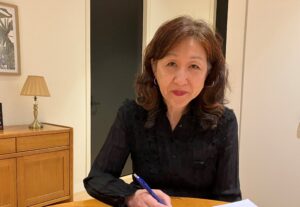
Kirralee Nicolle
8 March 2023
This International Women’s Day, The Melbourne Anglican has put equality and women’s church involvement in the church under the spotlight.
We spoke to two experts in women’s church engagement and asked them where they believed the status of women in churches currently stood, and what might need to change, and asked for input from women in the church around Melbourne.
Christians for Biblical Equality chair Deborah Upton said full equality for women was still a journey for the church. She said women’s involvement in churches was widely accepted on certain levels, but the nature of their involvement tended to vary depending on which theological views were currently popular.
Read more: Period drive aiming to empower not only women, but whole communities
“A lot depends on what’s happening with the next generation, in terms of what their focus is going to be and how they perceive equality for women within the church,” she said.
Whitley College lecturer and Baptist minister the Reverend Carolyn Francis said that women’s equal participation in the life of the church was a matter of church wellbeing.
Ms Francis said failing to fully involve women could also become a stumbling block for those who were looking to participate in a church community.
“If I think of a biblical metaphor like the body, the implication is that if there are parts which are not fully functioning, that we are collectively less than we would otherwise be,” Ms Francis said.
Read more: Women must be supported to withstand barriers to God’s call: Leaders
“Women as individuals are incredibly gifted in many cases and we can ill afford to turn away a gifted, willing participant in the church.”
“As people look at the church, whether from outside or within it, the vision of something which is not inclusive [and] seems outdated in all other parts of society is actually extremely detrimental to encouraging their belonging and participation.”
Last week, The Melbourne Anglican put out a survey asking women in Anglican churches the following question:
In what ways do you think the church could improve in its approach to the involvement of women and handling of issues specific to women?
Many women highlighted issues of accessibility for those working in ministry roles and a continuing sense that women were not being treated as having the same level of capability as men in similar roles. They also flagged complementarian theology or a lack of inclusivity in theological teaching as issues women were facing.
Read more: Young Anglicans unaware of opposition to women priests in some dioceses
Conversely, some said they noticed the church engaging in greater support of vulnerable members of the community and said some parts of the Anglican church were doing well to engage women and address issues specific to women.
These are not all of the responses, there were many more valuable contributions to the discussion. For the sake of brevity, we have categorised responses into two key sections, and have edited spelling and grammar for clarity where appropriate.
Women’s involvement in leadership
A high percentage of people in churches, ordained and lay, seem to be accepting of women being involved in the church – the very Anglo-Catholic and way-out evangelicals are the stumbling blocks. – Anonymous
Read more: Thirty years on, the church is richer for women’s ordination
I actually think that the Melbourne and Adelaide dioceses are doing really well in this area already. – Michele de Courcy
Appoint women priests when they are available and suitable without regard to gender, but instead with regard to vocation. Currently some vicar/lead pastor/priest in charge roles appear to be firmly closed to women priests because their gender.
Michele Duggan
Acknowledging the different styles of working – having meetings at different times, having more women in visible leadership roles – especially at Synod. – The Reverend Christine Croft
The church needs to be more hospitable towards women in ministry with children and towards gay women. – The Reverend Canon Professor Dorothy Lee FAHA
Read more: ‘Gentler, more inclusive church’: Female priests mark 30 years of ordination
The church is unable to change its approach to involving women. It remains a male dominated hierarchy, despite the support of women in many roles, they do not have an effective role in church decision-making. – Anonymous
I notice that in some parts of the Church the derivative nature of women and their subordination to men is still taught and practiced. At its worst this enables abuse of women, and at least inhibits women from fully valuing themselves as equally made in God’s image and equally called to leadership in God’s church.
The Reverend Canon Dr Colleen O’Reilly AM
Women are a sideline issue – the needs of women and proactively encouraging them into ministry. At times there feels as if there is a complementarian approach to women. – Fiona Dunn
Keeping this issue on the agenda that women in the church are still, in some areas, not offered equality in positions of leadership. For those in decision making positions to be actively promoting the inclusion and consideration of women into leadership roles. – Melanie Moore
Read more: Struggle continues despite 30 year milestone for women’s ordination
Most of the sexism and misogyny we face now is not at a structural level; but it is at the level of vicars who don’t support us discerning vocation; or college academics who have inflexible and rigid views about ministry and family life; or clergy who refuse to employ us for, or bully us out of, lay roles that would be valuable experience; or parishioners who engage in sexual harassment or bullying, or the like. We need to find appropriate – and safe – ways to name and talk about these experiences and expose them to scrutiny; and think about how to foster cultural change so that these are no longer things we all have to navigate.
Anonymous
I look forward to a time when equality is assumed, not fought for. When having a female leader no longer provokes comment (even when the comments are positive) and when the church can operate openly and with confidence in supporting women who experience domestic violence or mental health issues. – The Reverend Samantha White
Read more: Nearly a ‘runaway bride’ at her ordination, this is Jill Firth’s story
Individuality and inclusivity
We are all individuals and cannot be lumped together as 51 per cent of the population who all think the same or have the same needs and wants. Women in the in church are from different generations, different cultures, different professional/work backgrounds, are in different stages of life and enjoy different styles of churchmanship and have different views and opinions on theology. Bottom line there are some issues that impact women more than men but that doesn’t make the ‘women’s issues’. They are community issues which we need to solve together using all wonderful mix of humans God has given us in the church. – The Reverend Christine Croft
Just accepting women would like to talk about spiritual stuff along with others (men and women) and be involved still needs work. – Anonymous
It would be beneficial to tell more stories of women from the Bible … not just Mary but other significant and powerful women and their roles. – Anonymous
Some women’s-only events and Bible studies can be helpful at times (likewise, some men-only events). Keep teaching the Bible clearly and pastorally – as you preach through the Bible, you end up covering all kind of topics, from parenting to sexual abuse to marriage to work.
Fiona McLean
Read more: The asylum seeker who found God in the darkness
Care with using inclusive language in liturgy, hymns, prayers and preaching. Consciousness of values that are being encouraged subtly and overtly in the way meetings are arranged, who is invited to attend to various tasks, having women participate in the running of worship services. Ensuring that all women feel valued and included in the life of the church. Calling out values and attitudes that do not promote healthy and equal relationships between men and women. – Anonymous
Continue to emphasise healthy relationships, move away from a patriarchal world view. Continue to address family violence. I feel especially worried about the more complementarian/strict views and how that impacts women. Similarly, some of the wider GAFCON/AFES views are concerning and do impact the Anglican community. – Anonymous
The church is beginning to exercise an important role in addressing issues of safety for women and families. It has an important role to explore in loneliness and isolation particularly for young mothers and the elderly.
Jane Window
For more faith news, follow The Melbourne Anglican on Facebook, Twitter, or subscribe to our weekly emails.







